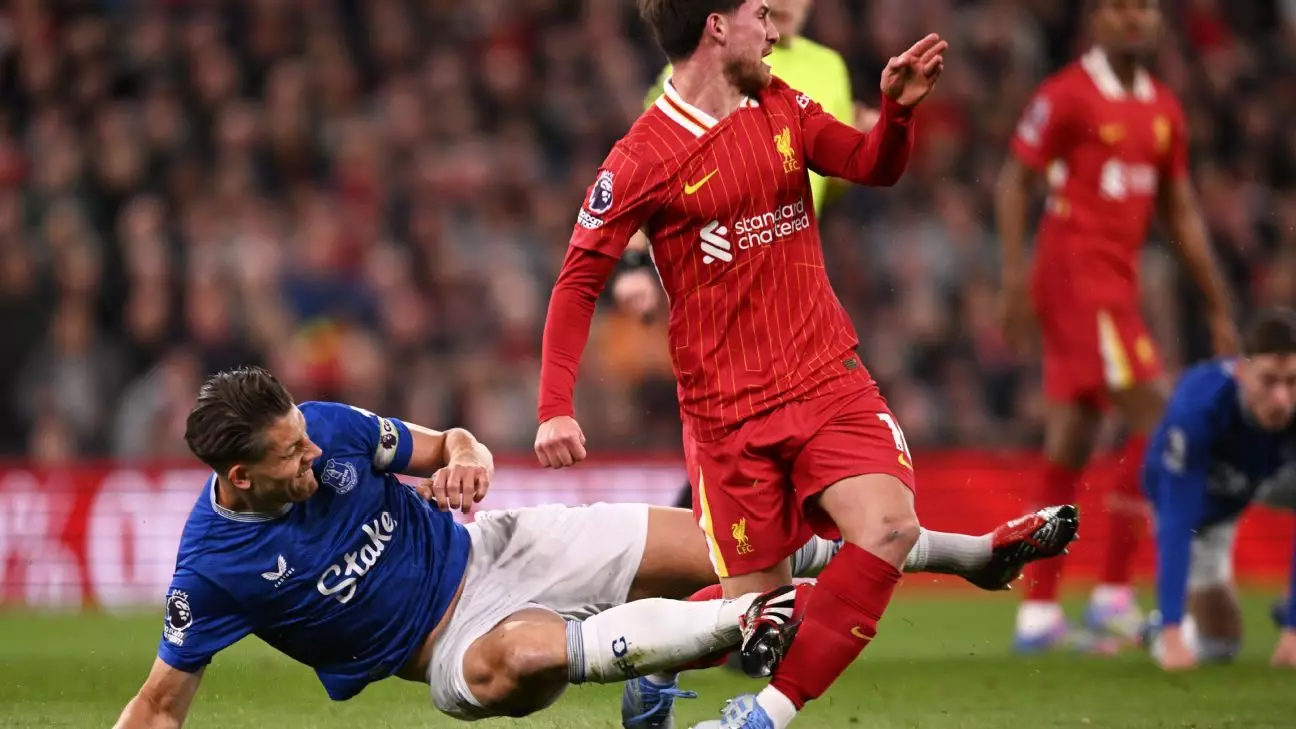In the pulsating atmosphere of the Merseyside derby, Liverpool narrowly triumphed over their fierce rivals, Everton, with a scoreline that may suggest a straightforward victory. However, the game has been overshadowed by a contentious refereeing decision that had fans and pundits alike buzzing with disbelief. Head coach Arne Slot made it abundantly clear that he was unfazed by the decision to let James Tarkowski off the hook after a dubious tackle on Liverpool’s Alexis Mac Allister. While Slot’s calm demeanor speaks to his experience in high-pressure situations, it is also indicative of a troubling trend in officiating where crucial moments seem to be overlooked despite widespread consensus on their severity.
Referee Blunders: A Growing Concern
The incident in question unfolded during the first half, as Tarkowski’s tackle drew immediate scrutiny from observers, with many believing it warranted a red card. As the referee, Sam Barrett, chose not to take action—despite VAR’s supposedly objective oversight—the question arises: how can a sport that prides itself on fairness allow such glaring discrepancies? Slot, while playing it diplomatic, hinted at the frustration that likely lingers among players and fans, stating, “Was I surprised? No.” This sentiment resonates deeply in a league renowned for its competitiveness, where every point matters.
Referee decisions can shape narratives and alter the course of a season. The reluctance to punish evident foul play not only jeopardizes player safety but also diminishes the integrity of the game. It’s imperative for referees and VAR officials to cultivate a more consistent approach to critical incidents that can significantly sway matches.
Turning Point for Diogo Jota
The match, however, was not solely about controversial calls. Diogo Jota’s resurgence marked a silver lining in Liverpool’s campaign, as he scored the solitary goal, breaking his ten-match drought. Slot’s praise for Jota underscored a player finding his footing again in a competitive environment. “He was close to scoring already in the first half,” Slot remarked, alluding to the build-up that showed Jota’s persistence in challenging an astute Everton defense.
His goal did not just elevate Liverpool’s standing in the league; it also served to rekindle Jota’s confidence. In football, momentum can shift drastically with a single goal, underscoring the delicate balance between being a hero and a mere spectator. Slot’s excitement about Jota’s performance reinforces the fact that player morale can significantly impact overall team dynamics, especially in a season fraught with pressure.
David Moyes: A Manager with Justifiable Frustration
Everton’s manager, David Moyes, was left fuming post-match at what he perceived as a clear offside in the lead-up to Jota’s winning goal. By asserting that an opposing player interfered with play, he highlighted a critical moment that could have potentially shifted the match’s outcome. Moyes’s insistence on the legitimacy of his claims reflects the competitive nature of top-tier football, where managers invest significant emotion in every decision that impacts their team’s fortune.
In the aftermath of the game, one is left to ponder whether the future of football officiating needs an overhaul. As the stakes become higher, so does the need for clarity and consistency in decision-making. The world watches as a sport beloved by millions grapples with ensuring fairness amid a myriad of opinions about what constitutes success and justice on the field.

